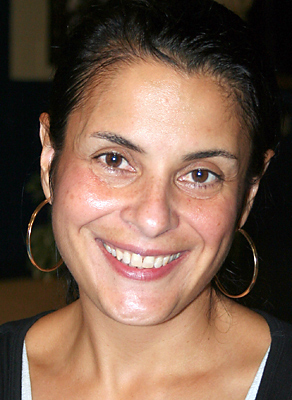

COLUMBIA — When Jodee Blanco talks about school bullies, she speaks from the heart. The pain of being bullied as a child shows on her face, even though she is a vibrant adult with a successful career.
Blanco went through physical and mental bullying during her middle and high school years in Illinois. As a result, she has made it her life’s work to help children who are going through the same torment.
The author and public speaker spent Sept. 14 at St. John Neumann School talking to students, staff and parents about bullying and how to deal with it. Her program drew about 100 people and was open to the public. Several parents brought their children.
In an emotional two-hour presentation, Blanco recalled how she overcame her painful childhood to build a successful career as a publicist in the cinematic and entertainment world. She smiled as she talked about working with clients such as Jim Carrey and Mel Gibson over the years. But she never forgot what she went through in school.
“I was the kid who cried myself to sleep every night after being bullied simply for being different,” she said.
Blanco said her life goals changed after the Columbine High school shootings in 1999, when two students who had been ostracized and teased over the years shot to death 12 classmates. The fact that the shooters had been bullied did not justify their actions, she said, but she understood the impulse for anger and aggression.
At one point in high school, the constant bullying led her to put a knife in her book bag, she said. Thankfully, her mother discovered it before she could go to school.
Shortly after the Columbine incident, Blanco wrote a book about bullying called “Please Stop Laughing At Me.” It quickly became a New York Times bestseller, and she started receiving thousands of e-mails and letters from children who were going through the same thing. She now tries to help students understand that laughing at their peers or picking on them because they look or act differently is harmful.
“It’s not just joking around,” she said. “In your minds you are joking around, but in reality you are damaging each other for life. I know because I stand here damaged. I will never be whole because of what those kids did to me.”
Blanco said two types of popular children are usually found in school: “elite leaders,” who make an effort to reach out to peers who may be excluded or ignored, and “elite tormentors,” who exclude people on purpose and pick on them for being different.
She said parents should avoid making certain comments to a bullied child because they only succeed in doing more damage and diminishing the child’s faith in the parent.
Those phrases include:
“Walk away and they’ll leave you alone.” Blanco said ignoring a bully often makes them react with even more persistence and violence toward their victim. This response can also make a child feel like the parent doesn’t care about what is going on.
“They feel that you’re ignoring the fact that the bullies are breaking their spirit, and by ignoring it, you’re helping to break them down as well,” she said.
Instead of ignoring it, they should immediately address the problem with the school, Blanco said. Start with the guidance counselor and move up from there to the principal, the superintendent or the school board if necessary.
“It’s just jealousy.” Bullied children are often what Blanco described as “the ancient child,” one who is sensitive, perceptive, and often has vocabulary and intelligence beyond their peers. Parents see this intelligence and may think the other students are jealous of their child’s difference.
“Don’t assume that the child is as emotionally mature as their intelligence might lead you to believe,” she said. “They’re still kids emotionally on the inside, and to kids the most important thing is fitting in. The victim of bullying gets tired of always having to be the bigger person.”
Blanco said it’s important for parents to listen carefully to their child’s story, without interrupting.
“When a child is about to confide in you, it’s like they’re giving you a gift,” she said. “Think about what you say to them in response. Kids respond to your words and to immediacy. After they tell you about being bullied, the key is to come up with one action you can do, right away, that is going to help deal with the problem.”
One of the quickest things a parent can do is enroll their bullied child in an activity they like one town over from where they live. This gives them a new social sphere that, at least one or two days a week, will remove them from the setting where they’re being bullied, and give them a chance to make a fresh start with new friends.
